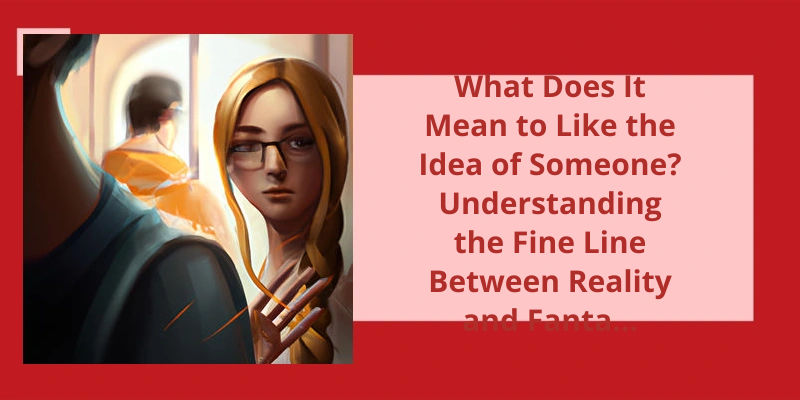But what about liking the idea of someone? This is a more complex emotion, as it suggests an affinity for the idealized version of a person, rather than the reality of who they are. It can stem from a desire for a particular type of partnership or a projection of qualities onto someone that they may not actually possess. On the other hand, not liking someone despite liking their idea may indicate a disconnect between expectations and truth. It can be challenging to reconcile the gap between what we want and what we have, but acknowledging this discrepancy can lead to greater self-awareness and growth in our relationships.
What Does Liking the Idea of Someone Means?
It means you develop an idea of who that person is in your mind, often based on simplistic or idealized characteristics. You might envision them as your dream partner, even though they’ve never shown any indication they feel the same way. Liking the idea of someone is common in early stages of dating or crushes, and can lead to disappointment or heartbreak if reality fails to match up to your imagined version of that person.
For example, you might admire their confidence, sense of humor, or adventurousness. By associating yourself with someone who possesses those qualities, you gain a sense of validation or validation from others. However, this can also lead to over-inflating that persons importance or judging them harshly if they fail to live up to your expectations.
At it’s core, liking the idea of someone is a kind of cognitive bias, a mental shortcut that allows you to form quick judgments or opinions about people based on limited information. Because it’s rooted in your own desires and emotions, it can be difficult to see the other person as they truly are, with their own unique backstory, personality, and motivations. To overcome this bias, it’s important to engage in active listening and communication, seeking out multiple perspectives and taking an honest look at your own reactions and assumptions.
Of course, it’s natural and normal to have positive feelings about someone youre attracted to or interested in. Liking the idea of someone only becomes problematic when it blinds you to the reality of that persons character, behavior, or intentions. It’s important to acknowledge and accept your own emotions while also staying open to new information and experiences that might challenge or enrich your understanding of that person.
Whether you’re navigating the murky waters of online dating or trying to successfully communicate your feelings to a long-term partner, it’s important to stay aware of your own biases and limitations, and to approach every interaction with a spirit of curiosity, empathy, and authenticity.
Interpersonal relationships can be complex and nuanced, causing us to question our own feelings and intentions. One common dilemma is whether liking the idea of someone is equivalent to liking them as a person. While the distinction may seem trivial, it can have profound implications for our emotions and behaviors.
Is Liking the Idea of Someone the Same as Liking Them?
The concept of liking someone versus liking the idea of being with them can be a confusing one. It can be difficult to discern whether you genuinely like someone for who they’re or whether you’re drawn to them because of the idea of being in a relationship with them.
However, it’s important to understand that there’s often a very thin line between the two concepts. When you first meet someone, it’s natural to be drawn to certain characteristics or qualities that they possess, and this may lead you to like the idea of being with them. Over time, as you get to know them better, you may find that you genuinely like them as a person, and this will reinforce your attraction to them.
It’s also worth bearing in mind that our perceptions and feelings about people can change over time. You may initially be drawn to someone because of the idea of being with them, but as you get to know them better, you may find that your feelings for them fade. Conversely, you may initially be less interested in someone, but as you spend more time with them, you may find yourself liking them more and more.
Ultimately, whether you like someone or the idea of being with them, it’s important to be mindful of your own feelings and intentions. If you find that you’re only attracted to someone because of the idea of being in a relationship with them, it may not be fair to either of you to pursue a relationship. Similarly, if you find that your feelings for someone are growing, it may be worth exploring those feelings further and seeing where they lead.
Ultimately, the key is to be honest with yourself and with the other person. If you’re upfront about your feelings and intentions, it will be easier to navigate the complexities of relationships and ensure that you’re building something genuine and meaningful. Whether you ultimately like someone, the idea of being with them, or both, the most important thing is to approach relationships with an open mind and an honest heart.
Liking the idea of someone versus actually liking them isn’t a black-and-white issue. Both concepts can be intertwined and evolve over time. The key is to be honest with yourself and others about your feelings and intentions, and to approach relationships with an open mind and an honest heart. With time, patience, and communication, you can build meaningful and genuine connections with people that stand the test of time.
How Can You Tell if You Really Like Someone or Just the Idea of Being in a Relationship?
One way to differentiate between liking someone and the idea of being in a relationship is by examining your feelings and actions towards the person. If you genuinely enjoy spending time with them, appreciate their qualities, and are willing to work through obstacles together, it may be a sign of true attraction. However, if you primarily focus on the benefits of being in a relationship, feel bored or uninterested when you’re with them, or rush into commitments without really getting to know them, it might indicate that you’re more interested in the idea of being in a relationship than the person themselves.
Source: Liking someone vs liking the idea of someone
When it comes to matters of the heart, there can be a lot of confusion between liking someone and having feelings for them. It’s important to understand that these two concepts aren’t one and the same, as research and personal experience have shown. In fact, it’s possible to have strong feelings for someone without necessarily liking them, and vice versa. Let’s explore this topic further to gain a deeper understanding of what it means to truly like and love someone.
Is Having Feelings for Someone the Same as Liking Them?
Feelings for someone generally refer to emotions that arise when a person finds someone attractive or appealing. It can be anything from a simple crush to infatuation, a deep sense of admiration or respect, or even being in love. These feelings can often be intense and can cause a person to act differently around the object of their affection. However, feelings for someone don’t always indicate a genuine interest in getting to know them or pursuing a romantic relationship.
On the other hand, liking someone involves a more nuanced appreciation of their personality, values, and interests. This can be the foundation for a strong and lasting friendship or a romantic relationship. Liking someone also involves accepting their flaws and imperfections and valuing them as a whole person. It’s possible to like someone without necessarily having strong feelings for them, and conversely, to have strong feelings for someone without truly liking them as a person.
Many people confuse feelings of lust or infatuation with love, which can be problematic when it comes to forming lasting relationships. Love is a complex emotion that’s built on a foundation of trust, respect, and kindness, and can’t be reduced to simple physical attraction or infatuation. It takes time and effort to build a genuine connection with someone and develop the kind of love that lasts.
Ultimately, whether we’ve feelings for someone or genuinely like them, it’s important to approach relationships with honesty and self-awareness. Being honest with ourselves about our feelings and intentions can help us navigate romantic relationships and form more authentic connections with others.
How Can We Differentiate Between Genuine Attraction and Fleeting Infatuation?
One way to distinguish between genuine attraction and fleeting infatuation is to assess the level of emotional connection and commitment. Genuine attraction tends to involve a deeper emotional connection and a willingness to invest in a long-term relationship, while infatuation may be based more on surface-level qualities and a desire for immediate gratification. It can also be helpful to take time to reflect on the intensity and duration of your feelings, as well as your overall level of compatibility and shared values with the other person.
Conclusion
Liking the idea of someone can be a curious and puzzling thing, especially when it comes to romantic relationships. While it's easy to get swept up in the idea of a perfect partner, it's important to remember that the fantasy may not always match up with reality. Relationships require time, effort, and genuine affection for the person you’re with, rather than simply liking the idea of them. It's crucial to be honest with yourself about your feelings and intentions, so that you can build relationships that are grounded in reality and built to last. Whatever your reasons for liking the idea of someone may be, it's important to ensure that they align with your values and desires, and that you’re willing to put in the work necessary to make the relationship blossom into something truly special.






